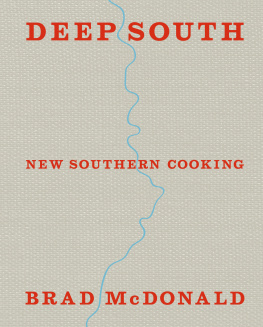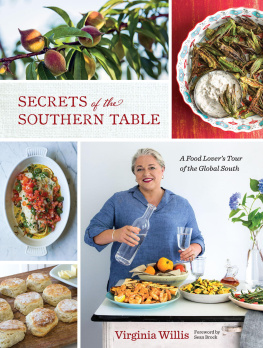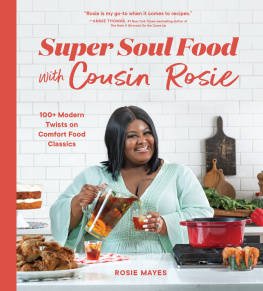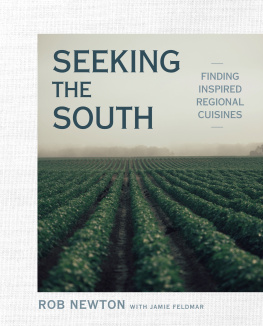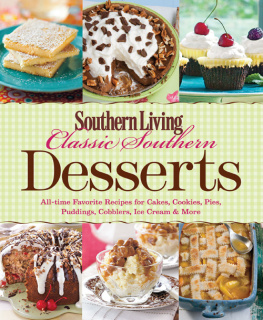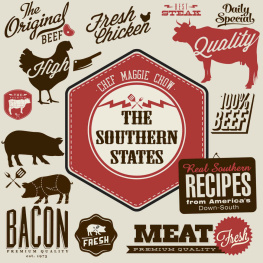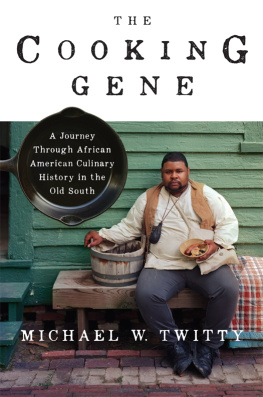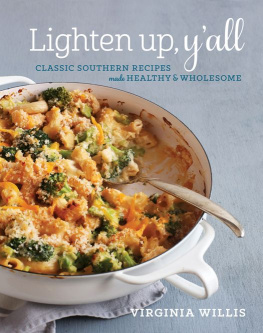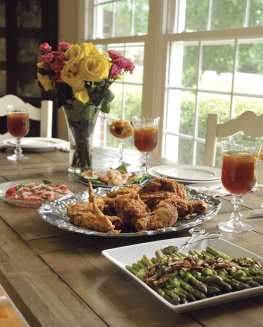Contents
I was raised in a family of carpenters, farmers and small-business entrepreneurs. Ending up as a chef, a job that requires both creativity and hands-on work for long hours at a time felt like finding my own craft. I was born in Mississippi so the food of the South is my heritage, yet its only recently that Ive begun to cook it professionally and to share it with others with pride. As a career chef, Ive been fortunate enough to work all over the world across different styles of cuisine, yet I have always been drawn back to my Southern roots. Cooking Southern food while living in London has become a way to make a culinary home away from home for myself. And Ive been able to find a parallel between the Southern and British aesthetic that feels natural and comfortable.
This book is about exploring Southern foodways and some of the areas most iconic dishes, almost from a distance as often as possible with authentic ingredients, but always through a British lens. The recipes are deep-rooted and soaked in Southernness because thats natural to me. This doesnt mean that I cook only for authenticitys sake. It means that in the pages that follow Im cooking for a region and a culture that demands a voice and preservation further afield than its own region and country. I believe that Ive been able to find common ground on what both cultures find to be delicious and fulfilling. One of the best compliments you can receive when cooking Southern food is when your dinner guests ask you for the recipe, or even better, tell you, That tastes like my Grandmother made it.
Ive used the opportunity to cook for a foreign audience to discover for myself all that the Southern larder has to offer. After cooking from other culinary repertoires for many years, I had been convinced by others that the cuisine of my heritage lacked finesse, so that it could not stand up next to the great cuisines of France, Japan, Italy and so on. It is through facing this stigma head-on in a foreign country that I have humbly realised that the food of the South is a great part of the culinary heritage of the United States, and one very worthy of cooking for and presenting to others.

The story of American cooking and the food culture weve developed for me has to start in the South. I have a burning curiosity to explore that. As I have researched recipes of smoked country ham versus an aged prosciutto, our summer sausage versus a salami and what makes them both so uniquely great, I have found a deeper understanding of Southern foodways and established a foundation to showcase proudly our ingredients and techniques.
Southern food may lack the romantic language of French food or the precision cuts of the Japanese, but there is no lack of depth in recipe writing or familiarity with ingredients. We only have to go as far as to read a recipe for turtle soup by Edna Lewis, the grande dame of Southern food writing. Her instructions for drawing out flavours in a stock are exactly the same as those for enhancing flavours in a dashi broth. These slow and elongated processes are universal. And what I love most about Southern food is how those ingredients so often come together in the pan rather than just on the plate, how flavour is built in layers through each step of the recipe. This is not always unique to the region: making country ham, for instance, from the curing process to hanging, smoking, hanging again and ageing, couldnt have been achieved without techniques crossing over from other cultures but they have been filtered to fit the peculiar identity of the South. I enjoy exploring that becoming an evangelist, and sharing the riches of my homeland.
Before I was taught how to cook French food in France, I actually learned in the South, under first a Southerner, John Currence, and then a French chef, Bruno Menard. Both walked me through the traditional techniques: how to make roux, a proper jus, a soup, a vinaigrette, a mayonnaise from scratch, how to make ice cream, a meringue, how to butcher and cook fish, to roast meats, to confit almost anything. Yet even then, I was working in one cuisine using the ingredients of another. We were cooking French food through a Southern lens with ingredients from around the world, not just the South.
I left the South to travel in my early twenties, finding my way into a few of the worlds best kitchens, working with some of the worlds most talented cooks. This time away from home taught me an important lesson when approaching tradition: ask questions for the right reasons and put deliciousness first. Ultimately, I think that is why I enjoy cooking Southern food, because it puts deliciousness first, it puts comfort first and I do love comforting food. But there is no reason why it has to be heavy or overbearing, so when Im developing a new dish, I always ask: does it need all of those rich ingredients? Could we take that layer of fat off the top to achieve a cleaner version? I dont mean healthier, per se, because this cuisine is very much food for the soul.
I mean, rather, that all good chefs have a desire to tinker to understand how and why dishes work. Perfecting the technique draws me back to Southern cuisine time and again. This is also known to a core of former mentors and colleagues of mine, as the practice of finesse and it is no coincidence that I would write that after having worked for Thomas Keller, perhaps the greatest American chef, as a young cook. It is more than the desire to know what makes a good buttermilk biscuit, reading the recipes, researching the technique. It is making the biscuits 50, 100, 200 times until they are better every time you make them. This is the process of making a recipe your own. This ability to tinker, when applied to the Southern repertoire, is a birthright, born out of my Southern heritage and having the deepest appreciation for it in my blood.
In this book, I want to give you a view of Southern cuisine as I know it and live it, but also a broader taste of Southern culture. The region is far too large and varying in styles and influences to cover every dish at once. And after all, Im from one small Mississippi town. I want to introduce you to the Southern cooking I know (partially developed with British ingredients), with a love and respect for authenticity that will allow you to replicate the tastes and the dishes, but also give you the courage to be playful. I want to share my home with you, but also give you a foundation so that you will earn the right to tinker with them.

